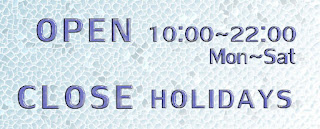[あの標識見てよ。]
Kay: Sign? What sign?
[標識?何の標識]
Hal: On that store.
[あの店の。]
Bee: Business hours. So what?
[営業時間。それで?]
Hal: But it's wrong!
[間違っているよ!]
Kay: ”Ten to Twenty-two.” That's ten o' clock in the morning to ten at night. But today's a Holiday, so today doesn't count.
["10:00~22:00." 朝の10時から夜の10時までやで。だけど今日は祝日。今日は別やな。]
Bee: See? It even says, "Close holidays."
[見て見、 "Close holidays" まで書いてある。]
Hal: That's the point!
[そうよ。そのことや。]
Bee: What's the point? It's a holiday. It's closed.
[なんだ。祝日だ。閉店。]
Hal: Like you say. It's "closed". C L O S E D. Not close like a command to shut the door. Not close like nearby. Closed. Past participle as an adjective.
[おっしゃる通り。「閉店され」ている。 C L O S E Dやで。ドアを閉めろの命令でも、近くに居るわけでもない。「閉鎖中」。過去分詞が形容詞の役を。]
Kay: Okay, so it should say "Opened", too, then?
[まあ、そういうなら、 "Opened" とも書いてあるはずやん。]
Hal: No, of course not. Open can be either an adjective or a verb.
[まさか。ちゃうねん。 Open だって、動詞でも形容詞でも活躍する。]
Bee: We-ell, so can close.
[じゃあっ、 close もそうだ。]
Hal: Not when you pronounce it with a "z" sound, it can't! It's the "s" sound when it's an adjective. Right?
[イヤイヤ、ザ行の「ズ」の場合はできない。形容詞の場合はサ行の「ス」やんか。]
Kay: So maybe they meant the "s" sound when they made the sign.
[なら、標識を使ったのは 「ス」の発音のつもりだったのかな?]
Hal: But "close" as an adjective means "nearby", not "closed".
[それでは、形容詞の "close" は「近くに」の意味なはず。「閉鎖中」ではありません。]
Matsu: Hi. I own this store. May I help you?
[今日は。僕、この店の持ち主しておりますが、何れ御用に役に立てませんでしょう?]
Hal: Huh?
[ハァ?]
Matsu: I stay close by the store on holidays, you see.
[休日は、ごらんの通り、いつも近くに居ります。]
Hal: Oh. Uh. I was just --
[ァ!あの、ただ…]
Bee: Yeah, actually, you carry hobby stuff, right?
[まあ、ほんなら、ホビー類のご取扱いですね。]
Matsu: That's right.
[さよ。]
Bee: Do you have electronics?
[電子系は置いてありますか?]
Matsu: We only stock some basic parts and kits, but we can order things like special parts for the Pi and Arduino, and op-amps, just about anything. And we have workbenches with oscilloscopes and other tools that you can rent by the hour.
[在庫は基本部品とキットだけですが、大体何でも注文できます。たとえば、パイやアルデュイーノの特別部品やオペアンプなど。それに、作業台やオシロスコープなどの道具を時間ごとの貸し出しをさせていただきます。]
Kay: Cool.
[かっこええ]
Matsu: Lots of people take a fancy to doing hobbies on the holidays, so I stay close by on the holiday.
[いろんなお客様は休日になったら、気まぐれでも趣味にかかわりたいことを思い出してくれるのでございます。ですから、近くに居ることにしております。]
Hal: Well, ... well, ... then you should say, "close by" or something, because "close" looks like you just made a mistake.
[で…は…それだったら、 "close by" とかでも言うべきではないでしょう? "Close" と言っているのはただの間違いのようですから。]
Matsu: Hmm. Maybe so. I guess I could go 3-D print a new sign pretty easily. "Close by"?
[まあ、もしかしてそう。新しい標識をまあまあ簡単に3次元印刷でもできないことないし。]
Hal: Uhm, maybe, "Available", instead. Or, "Ring the bell." You need more explanation.
[えぇっと、もしかして、その代わりに「利用可能」とか「お呼び出し下さい。」とか、もっと説明したらいいと思う。]
Bee: Do you have the latest Pi that we could look at?
[ちなみに、パイの最新型が在庫、見せていただけません?]
Matsu: Sure, do you want to come in?
[きっと。中へとあがって下さい。]
Kay: This is cool stuff! EPROM burners and programmable logic programmers, debug harness, circuit design software, ...
[格好ええ!イープロムや変更可回路の書き込み機、デバッグようのインターフェース、回路設計ソフト…]
Bee: Yeah. All that stuff that we always thought we had to use Brain-Semi's CPUs running TinyAlgorithms operating systems to do.
[な!一昔、「超小型手順社」の操作体系が「脳半導体社」の中央演算処理装置で動いていなかったら無理だと思った色んなものですね。]
Hal: You guys always teased me for not using that stuff everybody's been brainwashed into believing was industry standard.
[あんたらいつもバカにしてくれたんやな、だいたい皆が洗脳され、企業の標準と思っているものを使わない俺を。]
 Matsu: Excuse me, but could I ask your opinions?
Matsu: Excuse me, but could I ask your opinions?[もうしわけないけど、ご意見を聞かしていただけませんでしょう?]
Bee: Oh. New signs. Designed on the Pi.
[アっ。新しい標識だ。パイ上で設計をされ。]
Hal: Yep. He made them on the Pi.
[やっぱり。パイ上で作ってる。]
Kay: Looks good to me.
[よさそう。]
Bee: Me, too.
[ぼくも賛成。]
Matsu: Which do you like best?
[どちらがお気に入りですか?]
Hal: The last one is kind of plain. I think I prefer "call us about".
[後方がなんと地味なように感じます。"Call us about" の方がベスト、かな?]
Bee: I like "Available" best.
[ぼくは "Available" の方がいい。]
Kay: I like 'em all. Which looks good to you?
[どちもええと思う。どうですか。]
Matsu: Hmm ...
[まあ…]
[JMR20190529:
You know, thinking this over, I'm probably the odd man out here. If the sign in the store says "CLOSED" or "CLOSE", we know what it means, and, even among native speakers, people who care whether the past participle is used or not are probably in the minority.
良く考えると、はみ出ているやつはこの俺かも知れません。標識には "CLOSED" と書いてあっても "CLOSE" と書いてあってもわかるし、ネイティヴで英語しゃべる人の中でも、過去分詞の使い方に気を掛ける人がそれほどでもないようです。
In many countries where the majority do not natively speak English, you will find the grammar in such signs is not the (currently) correct grammar. That usage is now entering the US and the UK proper, simply because it is easier to think of "CLOSE" as the opposite of "OPEN". And lots of people outside those two countries are doing it that way, and few travelers ever take the time to mention why the grammar is wrong.
生まれながら英語でしゃべる人が小半数の国には、こういう標識に現れる文法が(つまり現在の)標準文法から外れていることに気が付くでしょう。この "OPEN" と "CLOSE" の非標準文法が英米に逆流し始めている様子が見えます。やはり、 "CLOSE" が "OPEN" の反対だと、簡単に考えられ、英米の国の国境を超えるところにはそのままが多いのです。どうして文法が間違っているかを説明する旅行者が多く居ません。
Anyway.
さて、と。]



0 件のコメント:
コメントを投稿